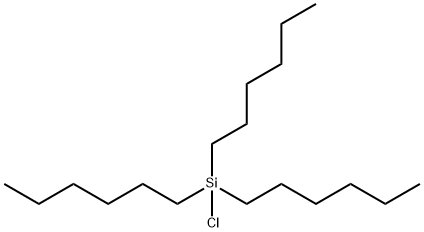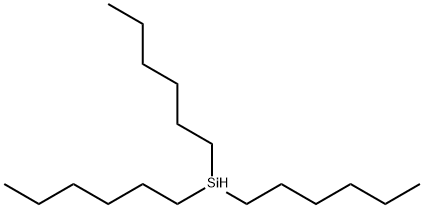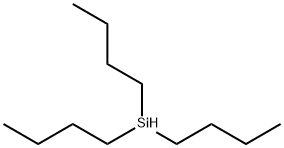TRI-N-HEXYLCHLOROSILANE
- CAS NO.:3634-67-1
- Empirical Formula: C18H39ClSi
- Molecular Weight: 319.04
- MDL number: MFCD00000510
- EINECS: 222-851-9
- SAFETY DATA SHEET (SDS)
- Update Date: 2024-12-18 14:08:57

What is TRI-N-HEXYLCHLOROSILANE?
The Uses of TRI-N-HEXYLCHLOROSILANE
Chlorotrihexylsilane is used as a surface modifier. It is used for enhanced dispersion of phosphor in polymeric matrix by using surface-modification
What are the applications of Application
Chlorotrihexylsilane is A product for proteomics research
Properties of TRI-N-HEXYLCHLOROSILANE
| Boiling point: | 153.5-154 °C/5 mmHg (lit.) |
| Density | 0.871 g/mL at 25 °C (lit.) |
| refractive index | 1.4560 |
| Flash point: | >110°C |
| form | clear liquid |
| color | Colorless to Light yellow |
| Specific Gravity | 0.871 |
| Hydrolytic Sensitivity | 8: reacts rapidly with moisture, water, protic solvents |
| CAS DataBase Reference | 3634-67-1(CAS DataBase Reference) |
| EPA Substance Registry System | Silane, chlorotrihexyl- (3634-67-1) |
Safety information for TRI-N-HEXYLCHLOROSILANE
| Signal word | Danger |
| Pictogram(s) |
 Corrosion Corrosives GHS05 |
| GHS Hazard Statements |
H314:Skin corrosion/irritation |
| Precautionary Statement Codes |
P280:Wear protective gloves/protective clothing/eye protection/face protection. P363:Wash contaminated clothing before reuse. P303+P361+P353:IF ON SKIN (or hair): Remove/Take off Immediately all contaminated clothing. Rinse SKIN with water/shower. P305+P351+P338:IF IN EYES: Rinse cautiously with water for several minutes. Remove contact lenses, if present and easy to do. Continuerinsing. P405:Store locked up. |
Computed Descriptors for TRI-N-HEXYLCHLOROSILANE
New Products
Tert-butyl bis(2-chloroethyl)carbamate (S)-3-Aminobutanenitrile hydrochloride N-Boc-D-alaninol N-BOC-D/L-ALANINOL N-octanoyl benzotriazole 4-Hydrazinobenzoic acid 3,4-Dibenzyloxybenzaldehyde Electrolytic Iron Powder 1,1’-CARBONYLDIIMIDAZOLE R-2-BENZYLOXY PROPIONIC ACID 4-HYDROXY BENZYL ALCOHOL 1,1’-CARBONYLDI (1,2-4 TRIAZOLE) S-2-CHLORO PROPIONIC ACID (2-Hydroxyphenyl)acetonitrile 4-Bromopyrazole 5-BROMO-2CYANO PYRIDINE 5,6-Dimethoxyindanone 5-broMo-2-chloro-N-cyclopentylpyriMidin-4-aMine 3-(2,4-Dimethoxybenzyl)dihydropyrimidine-2,4(1H,3H)-dione 6-Bromo-3-iodo-1-methyl-1H-indazole 4-Ethylbenzylamine N-(5-Amino-2-methylphenyl)acetamide 2-(BOC-Amino)4-picoline 1-(4-Methylphenylsulfonyl)-1H-1,2,3-benzotriazoleRelated products of tetrahydrofuran








You may like
-
 Chlorotrihexylsilane CAS 3634-67-1View Details
Chlorotrihexylsilane CAS 3634-67-1View Details
3634-67-1 -
 Chlorotrihexylsilane CAS 3634-67-1View Details
Chlorotrihexylsilane CAS 3634-67-1View Details
3634-67-1 -
 100-71-0 99%View Details
100-71-0 99%View Details
100-71-0 -
 Chloro Uracil 1820-81-1 99%View Details
Chloro Uracil 1820-81-1 99%View Details
1820-81-1 -
 2-ethyl-6-methyl-3-hydroxypyridine succinate 127464-43-1 99%View Details
2-ethyl-6-methyl-3-hydroxypyridine succinate 127464-43-1 99%View Details
127464-43-1 -
 13162-05-5 N-Vinylformamide 99%View Details
13162-05-5 N-Vinylformamide 99%View Details
13162-05-5 -
 1446013-08-6 98%View Details
1446013-08-6 98%View Details
1446013-08-6 -
 Ste-Glu-AEEA-AEEA-OSUView Details
Ste-Glu-AEEA-AEEA-OSUView Details
1169630-40-3
Statement: All products displayed on this website are only used for non medical purposes such as industrial applications or scientific research, and cannot be used for clinical diagnosis or treatment of humans or animals. They are not medicinal or edible.